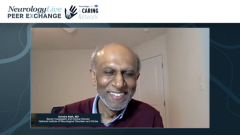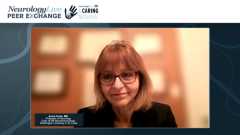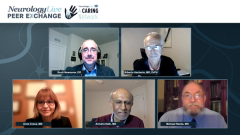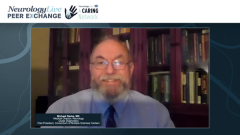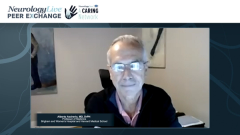
Therapeutic Implications Regarding the Role of Epstein-Barr Virus in MS
The expert panelists comment on intervention efforts underway to address multiple sclerosis prevention and treatment.
Episodes in this series

Scott Newsome, DO: Going back to what I alluded to, if this happens to be the heavy hitter, so to speak, then where can we intervene to prevent the development of MS [multiple sclerosis] in an individual who may be at higher risk? Or if someone already has MS, is there opportunity to decrease the severity of the disease? Or if it’s someone who has progressive disease, is there an opportunity to limit the disease progression? I’m curious to hear the panel’s thoughts. Anyone can answer. I struggle with the patient who comes in who has children and, from a genetic predisposition, their child is already at a little higher risk. Then they have mononucleosis. Can we intervene earlier to prevent disease? I don’t know if someone wants to jump on that.
Anne Cross, MD: For years, I’ve been talking to my patients about making certain that their children weren’t vitamin D deficient, whether that truly has an effect or not. It wouldn’t be a bad thing to make sure they aren’t vitamin D deficient. The same thing is to keep them from smoking or getting obese. I’ve always said to them, “And there’s Epstein-Barr virus and mononucleosis,” but I don’t know how you’re going to stop them from getting that. Because Epstein-Barr virus [EBV] is also associated with other diseases and cancers, I’m hoping we’ll eventually have an effective and safe vaccine that we can give to people, maybe just those who are susceptible, or maybe everyone to help prevent it.
Scott Newsome, DO: Just tell your kids, “Don’t kiss anyone. Stay away from people.” The kissing disease; that’s what I remember growing up and hearing, which isn’t feasible.
Avindra Nath, MD: That’s because the councils are so large, they’re kissing one another. It’s not from kissing.
Scott Newsome, DO: That’s right. Anne, you mentioned a potential treatment, a vaccine. There are some things in development. Avi, because you’re the preeminent neurovirologist and viruses are close to your heart, where we are with the science in developing the vaccine that may be specific to EBV? Where we need to go?
Avindra Nath, MD: A number of companies are interested in making a vaccine. Merck is making a vaccine. I met with them once pre-COVID-19, and they were very interested. They’ve already made headway. There are several other companies. Steve Jacobson has been working with another company, and they’re making a vaccine. I don’t know how close they are to doing human trials, but it seems that they’re pretty close. Anne, I don’t know if you have additional information on them.
Scott Newsome, DO: You could probably talk about this better than we can. With the enrolled study, Atara Biotherapeutics has an EBV potential therapeutic that’s T-cell directed, but I don’t know if anyone can talk about it. It’s interesting. Maybe I misread this, but I heard Moderna is also developing an mRNA [vaccine], which could be very interesting as well.
Avindra Nath, MD: Yes, they’re making mRNA vaccines for a lot of pathogens. They can just type it and use it.
Alberto Ascherio, MD, DrPH: Moderna has a phase 1 study going on with an EBV vaccine. It’s useful to separate the discussion between prevention and treatment, because the data are pretty compelling that if you could completely prevent EBV infection, you’d prevent MS. A vaccine doesn’t necessarily prevent disease, as we know from COVID-19. The discussion on the vaccine would be whether we can have a vaccine that confers long-lasting sterile immunity. If we can, that would prevent MS.
If we have a vaccine that can affect the immune response but doesn’t completely prevent infection, then the effect of the risk of MS will depend on the specifics of the vaccine, how it affects the immune response, and the mechanisms that relate EBV to MS. That’s the big unknown. I hope to learn and discover from you guys. Given that EBV is causing MS, how does that happen? That’s the $1 billion question. Once you have MS, is it still early enough to change the virus host relation, or is it too late? Is it a hit and run, as Avi mentioned? Is it that the virus triggers an immune response that becomes physically autonomous, and it doesn’t need the virus anymore and takes its own way? I don’t know that. I wish I knew. That’s what keeps me awake at night, trying to think.
We have clues in both directions. There are some hints. We know the virus is there, that it doesn’t go away. We know they’re depleting the B cells that are the site of persistence of the virus. It’s a dramatic therapeutic effect. The virus is there in a latent form, but it’s very active. Its immunosuppression will cause lymph proliferation. Even if the mechanism of damage is from the new response against the virus, these elements suggest that the virus is still playing a role in keeping that immune response active and strong and possibly cytotoxic, either molecular mimicry or collateral damage, or even transformation of the B cells themselves because it’s an oncogenic virus. Maybe the EBV virus could transform B cells in the way that dysregulate the…. It’s also possible that all this is history. Once you have MS, you can even wipe away the virus but unfortunately it’s too late. I don’t know the answer to that.
Scott Newsome, DO: I like how you’re separating prevention, and then once someone has MS, the propagation of the immune responses, whether it’s EBV related or not. Avi and Mike, do you have any comments on that? There’s some work being done looking at that with Larry Steinman’s group, that recent paper that Mike alluded too. I don’t know if that provides any more insight to that question.
Michael Racke, MD: It gets back to the idea of whether it’s molecular mimicry. If it’s molecular mimicry and you’ve gotten rid of the fires, but you already have T cells that are recognizing some other self-antigen, then I could evoke Avi’s epitope spreading and get rid of EBV; it doesn’t matter. I even would make the argument that I’ve done a lot of work in autologous hematopoietic stem cell transplantation, and some of those people get cured. Why is it that they get cured? Maybe the other argument is, why is it that there are some people who break away? I’ve always used the argument. I’d tell the patients, “I’m trying to make you your identical twin who doesn’t have MS.” That’s still making the argument that you have to have an infectious agent like EBV. If I clean your immune system, for whatever reason, you have to get EBV again or whatever viruses you need to once again recapitulate the events to get MS. For some reason, in three-quarters of the patients, that doesn’t happen and they don’t get MS anymore. There’s a lot of work to be done to try to understand how viruses cause disease, and certainly for demyelinating disease.
Transcript Edited for Clarity
Newsletter
Keep your finger on the pulse of neurology—subscribe to NeurologyLive for expert interviews, new data, and breakthrough treatment updates.

